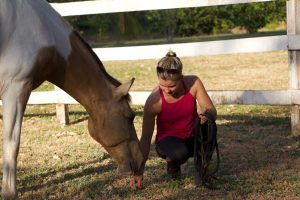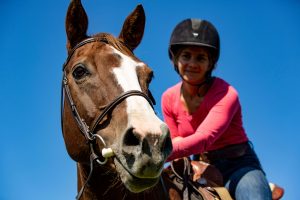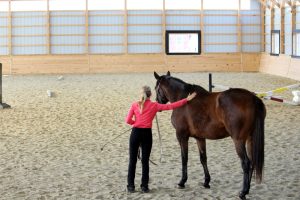Progress makes us feel good. It makes us feel accomplished and proud. But when we want to truly improve, to master a skill, to do something we could not do before, we need to be careful that the progress is not an illusion.
There are several ways we can be deceived by the illusion of progress, and we each have the type of illusion we are most susceptible to.
In this article, I will explain different phases of the learning process we all use, and how to recognize the value of each phase, ensuring we continue to make true progress, and not get caught in an illusion.
When we recognize the opportunity to engage in the right phase of learning, we can keep moving towards our goals, without wasted time or frustration, no matter our circumstances.

The phases of the learning process are not linear, but a cycle. We move through them repeatedly as we go deeper into any subject.
It begins with interest.
What first drew your interest to horses and riding? Was it a trail ride you took on a vacation, a lingering childhood memory of the magic of horses, hearing a friend talk about their new horse?
After interest is created, from experience or thought, we typically begin with gathering and consuming information. We read new books, watch videos, listen to different people, sign up for classes. We consume this information, not necessarily engaging deeply with it, but still learning about different views, different theories, and different opinions.
The next step is study. In this stage, we go deeper. We move beyond simply consuming the information to actually engaging with it, perhaps making notes, pondering questions, reaching out and talking to the experts. It is easy to consume information, but studying brings in a higher level of cognitive effort.
Finally, we start to actually do the thing we are learning about. We practice it. Through that practice, we build real skills, we go beyond just knowledge. Through trial and error, we develop a sense for and a feeling of, the subject we have studied.
As we practice, more questions are generated, we seek out more information, and the learning phases begin again.

Here’s an example of the learning process in a different subject than riding…learning to cook. Something piques your interest in cooking, perhaps a delicious meal at a restaurant, a friend who inspires you, a desire for a healthier way of living, even necessity as restaurants close!
You begin by consuming information, you search out recipes online, you buy a few cookbooks, you watch cooking videos.
Next, you move into study. Perhaps you find a chef you really like and focus on understanding their methods. You ask friends what the ingredients were in that dish they served, or do they prefer using butter or coconut oil when baking?
Then you put it into practice, cutting, sauteing, mixing, and roasting. Some meals turn out, others get burnt, but with each trial, successful or not, you learn something, you figure out what you need more information on, and so, the cycle continues.

Think of how these learning phases have existed in your own riding journey… there were times you read every book and watched every YouTube video you could find. Then there was a time you found one teacher, or method, or idea, that resonated with you and you studied it deeper – you didn’t just watch the videos or sign up for the course, but you truly engaged, taking notes and asking questions.
Then, there have been times you focused on practice, consistently going to the barn, leasing a horse for more riding time, or doing an intensive clinic.
As long as we keep moving through these phases, progress continues. However, if we stay in one phase too long, we may feel as though we are progressing, but it’s likely an illusion.
Here’s how each phase has the potential to keep us stuck…
Consuming information is the easiest to do. With today’s information age, a trove of articles, videos, and websites are available on almost any subject with just a few clicks. Reading or listening can be very passive, they don’t take much effort, but they provide the feeling that we are really getting ahead – we know so much more than we did before. This is valuable, but limited on its own.
Consuming lots of information without ever studying or practicing is perhaps the most common illusion of progress.
But study can trap us too, we can get obsessed with thinking about something, with having to feel as though we fully understand it before we do it. This is the person who can debate every theory, who knows all the principles, but has no practical skills because they have never moved to practice. Practice is a risk, because it may challenge the theories they believe.
Practicing continually can produce just as much of an illusion. The hard work creates the sense of getting ahead, but “practice without theory is senseless” and doing the same thing over and over is unlikely to produce a different result. If you don’t understand the why behind what you practice, there are no other options when it doesn’t work other than to try harder.
The rider who tries to achieve a more stable position by pushing their heels down and bracing against the stirrups will not find that increased stability, no matter how much effort they put into heels down.
As you read about the phases of learning, did you notice if there is one phase you tend to get stuck in? Do you spend too long consuming information without doing anything or do you practice all the time, but without learning new ideas?
Allow knowledge to be what guides your practice, and keep the phases of learning in balance.
Even with the current world events, and no matter what your situation, you can engage in each learning phase of your riding.

Practice can be more than just riding, especially now, when many people are staying at home and unable to ride. Practice can be taking a few moments to consciously pay attention to one’s breathing, to move through a few exercises to increase your body awareness or improve your posture. It can be bringing home a set of reins to have better dexterity and rein handling.
Extra time at home can also be used to read a new book, or renewed focus can be found with deep study.
What is the phase of learning you could focus on more now?














15 Responses
Have you come across the work of BJ Fogg Tiny Habits? I am listening to his book and enrolled in a course and it is amazing. I’m applying some of the teachings not only for myself but for my horse. It echoes so much of what you say Callie, about keeping it simple breaking down the task into really tiny steps. And perfecting those tiny steps. One of the things I’m hung up upon is the concept of using food/treats as a reward or a motivator. My understanding about clicker training it’s all in the timing. I am not very good at that. In the book BJ talks about celebration/reward that it creates a good feeling, the release of dopamine, and by extension is creates a habit. When I celebrate I feel good. Can I apply this to my horse? Thanks everyone please jump in and respond
Hi Lindsay,
Regarding clicker training, I’m not sure if this is what you meant, but keep in mind that the click is just to mark the behavior and offer the ‘promise’ of the reward. It buys you the time to produce the treat without having to juggle your reaction, the clicker and the treat all at once. Like Pavlov’s dogs, the clicker creates the anticipation of the actual reward/good feeling.
Like Pavlov’s dogs, the clicker creates the anticipation of the actual reward/good feeling.
Hi Lindsay! I love BJ Fogg! Yes, I have read a lot about his work. In your question, do you mean can we celebrate with our horse? Is knowing they did a good job enough? I think this depends on the horse and the relationship they have with their handler and with training. While I do think that horses understand praise, I believe that how much they value it depends on other contexts it’s been used. A horse who associates praise with food and fun will enjoy it and may work for it – but only to a point.
I think that part of why humans enjoy praise is we can think about the past, holding it in our minds as we celebrate. I’m not sure horses can do that so it would make the experience very different.
Barb left a good comment too about clicker training and understanding the difference between the marker and the reinforcement. The timing of the marker, the click, is very important, as you acknowledged!
Good question!
Thanks. I tend to get stuck because I realized I was happy in my ignorance and had to unlearn the things I thought I knew. I am focusing on connection and communication of my horses and the people I look to for advice. You have made the cut.
Steve
is this workshop going to be ableto be viewed after it is complete? I am a nurse and work 12 hour shift. I am scheduled literally every day, only on occasion do I get called to stay home. but I loved the 7 day video series.
Hi Susan, the videos are pre-recorded so you can watch them at your own convenience but the videos will only be available for a limited time. Hope you’ll join the workshop and a big thank you for all of your hard work on the front lines of this pandemic.
-Julia, CRK Training Community Manager
Thank you. I get frustrated at my lack of progress and going back to simple basics. But your blog made me realize simple basics are invaluable for getting it right. Super frustrated at the moment because I slipped off the mounting block trying to get on for a bareback lesson early this week and have a sore knee. I’m grateful it’s not worse. Can’t wait to get back in the arena!
Very clear and so true, this article. Because of the Stay Home directive, I am finding new ways and joy in using all this open time. I do not have a horse in my care, nor am I able to spent anytime at my two beloved horse farms… Honey Brook and Forever Spring, nor take lessons with Callie or Kaitlyn at Honey Brook Farm. So….I am focused on building my strength, flexibility, and aerobic capacity. All much needed for me to move forward in riding. I take small steps each day in each area, with hatha yoga, weights, and walking…and keep increasing…and am so happy for this. Also, I love Liberty work, so I practice what I have learned from all my meditation teachers about connection, and also the teachings of Callie , Andrea Wady, and Sharon Wilsie… Practice all this with my dogs, with the birds and squirrels and fox in my yard, the children next door, the delivery and grocery angels, with my friends, and just connecting with myself. In small steps. I do all the reading and study too, but as Callie says, that only takes one so far, with out the actual embodied experience. Thanks for the reminder Callie.
Hi Kathy, we miss seeing you around the farm! Practice can be limited for many of us because of the stay at home orders. I hope you are staying healthy!
-Julia, CRK Training Community Manager
Hi There- cooking example on target for me- like so many others I’ve been baking. took all the steps you mentioned – stalled a bit in the research which is typical for me. Did make it through though and have made it to the practice and even the second round of practice using my own judgement from what I learned from the first round. Wish I could show you the bread. I’m very proud of it.
Usually follow the same pattern with my riding. I am not sure how to move from the research a bit quicker. Maybe now that you have laid out the sequence for me I will try to allow myself to not get bogged down in phase one. Thanks- come to Simi Valley, CA and have bread, cheese and glass of wine. would love to have you. Hope you are not gluten free- if I eat all this bread myself my horse is not going to like the extra weight.
Hi Liz, your bread sounds amazing! thanks for the invitation and thankfully I am not gluten free, I love bread too!
The phase of learning I could do more, right now, is practice, practice, practice. I have been in the other phases for quite a while and; though, I’ve had practice, it has been chock full of, “This isn’t working. What am I doing wrong???” This resulted in more study. Fortunately, the weather here in Upstate New York is improving and, being home more than not, these days, my interaction with the horses has been less rushed. I’ve enjoyed more riding, recently. Also, I feel that Yoga for Riders has been very beneficial in helping me to be more conscious of my posture and breathing which, in turn, has helped me overcome the anxiety I would feel when getting ready to ride.
Hi Janice, thanks for your comment! I am so glad to hear that Yoga for Riders has been benefitting you in your riding and managing your anxiety I know some riders aren’t able to get to practice right now but hopefully that turns around soon!
I know some riders aren’t able to get to practice right now but hopefully that turns around soon!
-Julia, CRK Training Community Manager
Guilty as charged! Seriously, Callie, I felt at times you were speaking to me. I’m a learner—scooping up everything I can on a subject, just as you mentioned. In my case, starting so late into riding, I feel behind the eight ball on every aspect of horsemanship—tack, terminology, mechanics and of course the physical aspect of riding. Only having one lesson a week, I am trying to create bonding time with my lesson horse, learning from the instructor’s directions and trying to experience the ‘feel’ of the lesson. Lots happening and then another week goes by before starting all over again. Sometimes, I feel I’m treading water and the processing of the lesson experience is somehow incomplete. Hence, more diving into videos, books, etc. to try to put it all in perspective.
We are all a little guilty of this at times Barb, you aren’t alone! I hope this article gives you the insight to be able to move out of your current phase
-Julia, CRK Training Community Manager